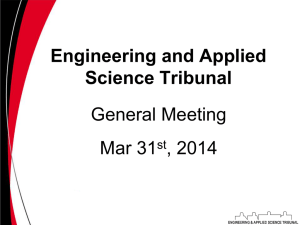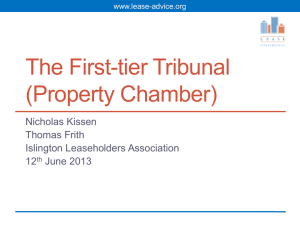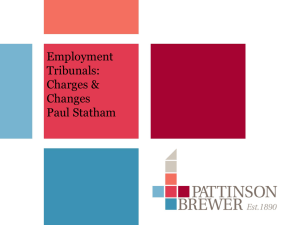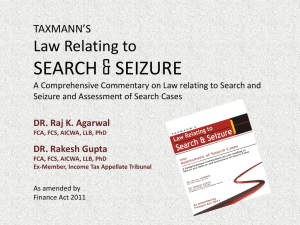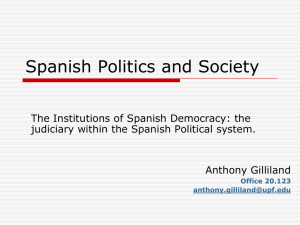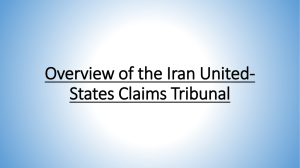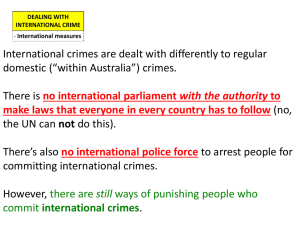LESSON 8 PAD190
advertisement
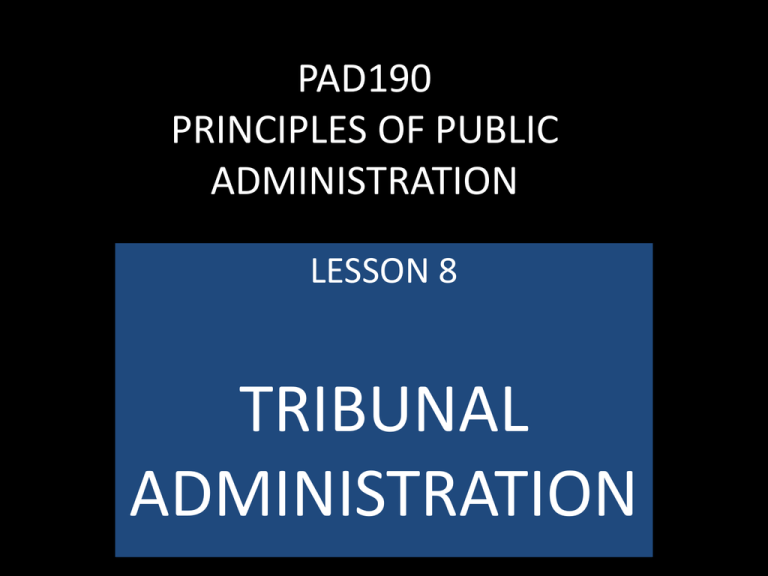
PAD190 PRINCIPLES OF PUBLIC ADMINISTRATION LESSON 8 TRIBUNAL ADMINISTRATION INTRODUCTION Public administration deals with many public complaints and claims such as dissatisfaction on the administration of public services. This particular complaint has raised a dispute, such as consumer dispute on goods and public service dispute on government tax. There must be an institution or agency to refer and resolve these complaints and claims. Tribunal administration has been established for adjudication of these disputes. THE OBJECTIVES OF THIS LESSON After attended this lecture student should be able to:1. Define tribunal administration. 2. Describe the functions of tribunal administration. 3. Describe the importance of tribunal administration in public administration. 4. Explain the types of tribunal administration. 5. Describe the challenges of tribunal administration. WHAT IS TRIBUNAL ADMINISTRATION? • Tribunal administration is an institution established by the government to settle an administrative complaints raised by the public • A body established by or under Act of Parliament to decide claims and disputes arising in connection with the administration of legislative schemes, normally of a welfare or regulatory nature. • As an independent body to provides independent review of a wide range of administrative decisions. Most of them, however, have judicial functions as well. THE IMPORTANCE OF TRIBUNAL • the relief of congestion in the ordinary courts of law (the courts could not cope with the case-load; • the provision of a speedier and cheaper procedure than that afforded by the ordinary courts (tribunals avoid the formality of the ordinary courts); and • the desire to have specific issues dealt with by persons with an intimate knowledge and experience of the problems involved (which a court with a wide general jurisdiction might not acquire). • considers applications to determine who should make a treatment decision. THE PROCESS OF TRBUNAL • FILING AND REGISTRATION – Receive any complaint or claim lodged by an interested person for any lost or suffered concerning his interest. • NOTICE OF HEARING - Tribunal will issue a notice of hearing in stating the date, place and time of hearing and thereafter serve the notice of hearing on both the claimant and the respondent. • ADJUDICATION PROCESS – Conducting the hearing to assist the parties to effect a settlement of the claim by consent. The hearing before the Tribunal shall be presided over by a member of the Tribunal (referred to as “President”. • DECISION/AWARD - The Tribunal shall, where practicable, make its award within sixty days from the first day of the hearing before the Tribunal. • At a hearing the Tribunal may make any one or more of the awards such as: 1. a party to the proceedings pays money to any other party 2. Money be awarded to compensate for any loss or damage suffered by the claimant TRIBUNAL ADMINISTRATION IN MALAYSIA TRIBUNAL FOR CONSUMER CLAIMS PUBLIC SERVICE TRIBUNAL INDUSTRIAL COURT TRIBUNAL FOR HOMEBUYER MALAYSIA CUSTOMS APPEAL TRIBUNAL AND CUSTOMS RULING TRIBUNAL FOR CONSUMER CLAIMS MALAYSIA (TTPM) • The Tribunal for Consumer Claims is an independent body established under Section 85, Part XII of the Consumer Protection Act 1999. The Tribunal operates under the Ministry of Domestic Trade, Co-operatives and Consumerism. The primary objective of establishing the Tribunal is to provide an alternative forum for consumers to file claims in a simple, inexpensive and speedy manner. JURISDICTION OF TTPM The Tribunal shall hear and determine :a) any claim in respect of any matter within its jurisdiction as provided under the Act; b) where the total amount claimed does not exceed RM25,000.00; and c) any other matter prescribed by the Minister by order published in the Gazette. INDUSTRIAL COURT OF MALAYSIA • Established for creating a harmonious industrial environment through the process of arbitration and the decisions of the Court (Award) consistent within Industrial Relations Act 1967. • The present Industrial Court was established under the Industrial Relations Act 1967 and managed by The Ministry of Human Resources. JURISDICTIONS • To hear and hand down decisions or awards in industrial disputes referred to it by the Minister or directly by the parties. • To grant cognizance to the collective agreements which have been jointly deposited by the employers/ trade union of employers and trade union of employees. PUBLIC SERVICE TRIBUNAL OF MALAYSIA • An independent, quasi-judicial body with a mandate to consider and dispose of complaints or anomaly for staffing and staffing recourse in public service. • Was established under the Public Service Tribunal Act 1977 but was dissolved by the Public Service Tribunal (Dissolution) Act 1999. • After this dissolution, any anomaly should directly referred to the government and Minister. TRIBUNAL FOR HOMEBUYER CLAIMS MALAYSIA • The tribunal listen any claim’s cases which are including the housing projects in Peninsular Malaysia, not included Sabah and Sarawak. • Provides an alternative channel for house buyers to claim any compensation from housing developer due to house defect bought. • Established by the Ministry of Housing and Local Government (National Housing Department) CUSTOMS APPEAL TRIBUNAL AND CUSTOMS RULLING • Customs Appeal Tribunal (CAT) is an independent body, establish to decide on appeals against the decision of the Director General of Customs pertaining to matters under the Custom Act 1967, Sales Tax Act 1972, Service Tax Act 1975 and Excise Act 1976. • Established by the Treasury, Ministry of Finance Internet Links • http://ttpm.kpdnkk.gov.my/portal/index.php? option=com_frontpage&Itemid=1 • http://www.treasury.gov.my/index.php?optio n=com_content&view=category&id=154%3Ab ahagian-tribunal-rayuankastam&Itemid=259&lang=en TUTORIAL • Define tribunal administration. • Describe tribunal administration in Malaysia. THAT ALL FOR TODAY SEE YOU AGAIN NEXT LECTURE LESSON 9 “FINANCIAL ADMINISTRATION” THANK YOU

